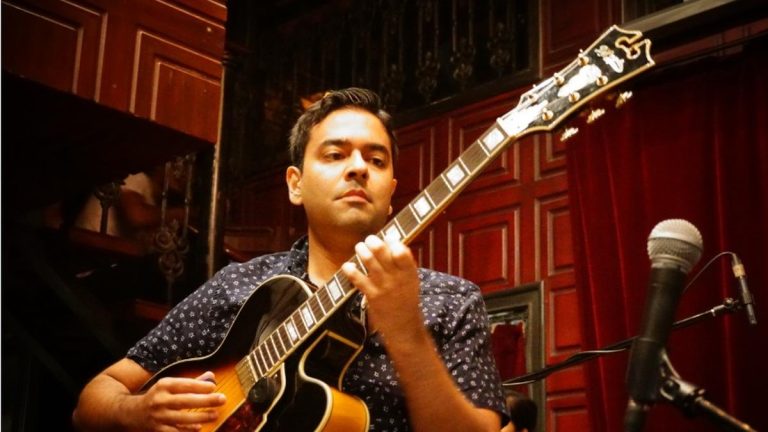
Karan Khosla
| Photo Credit: Special Arrangement
Most people dream of escaping the corporate grind — Karan Khosla did it. Swapping spreadsheets for sheet music, he turned his passion for jazz into a full-fledged career. It has been quite a leap for Karan, who has a degree in Physics with a concentration in Applied Mathematics, to transition into a career in music. “Finance funded my music education,” he says over the phone, making numbers work in more ways than one.
Karan Khosla‘s latest release, Genesis, is a statement. It signifies a new beginning, an exploration of possibilities in music, and a reminder that there are no predefined boxes in creativity. “It is the beginning of many things to come,” says Karan. “At any point in life, you can start something new. Genesis means go out and do it. Be free.”
Karan initially conceived Genesis as part of a larger project called Horizon, a long-term vision for the next 20 to 30 years of his musical journey. “I wanted to explore what the future of my music and the jazz space at large could look like,” he explains. “Genesis was the first step in that process, setting the mood for what is to come, creating something from nothing.”

A global experiment
The album came together in an unconventional way. Karan envisioned a contemporary jazz ensemble, but bringing musicians together in one place was impractical. Instead, he leveraged technology, collaborating remotely with musicians from around the world — Argentina, Spain, and Italy.
“I composed the music on the guitar, wrote the sheet music, and sent it to them,” he says. “Everyone was excited to be a part of it, and we recorded everything online. People often say jazz must be recorded live, but we proved that a remote collaboration can sound just as authentic. This project was an experiment to see if we could create high-quality jazz without being in the same room. And it worked.”
Recording remotely posed unique challenges. Karan had attempted similar projects before, but they did not sound cohesive. “The key realisation was that the arrangement had to be clear, allowing musicians to express themselves. I created a detailed backing track with all instruments to guide them, while still giving them space to improvise. That made all the difference.”
Despite the challenges of coordinating across time zones and ensuring consistency in sound, the entire album came together in two months. “Managing an online project requires a lot of organisation, which is not my natural strength,” he admits. “But waiting for the perfect studio setup was never an option — this was the best way forward.”
The Indian perspective
Unlike many jazz musicians from India who blend jazz with Indian classical music, Karan chose a different path. “I wanted to honour the tradition of classic jazz rather than create a fusion,” he explains. “My contribution as an Indian musician was not in altering the genre, but in interpreting it with authenticity and respect.”
Karan believes jazz is no longer niche in India. “There is a lot of curiosity about jazz here. We have students from cities like Raipur and Jhansi, eager to learn how to incorporate jazz elements into their music. The modern sound of Bollywood and regional music has strong jazz influences, so more musicians are keen to understand its essence. Jazz is going to be a big movement in India.”
Karan co-founded the Goa Jazz Academy five years ago. The academy is focused on making jazz education accessible. “Jazz is not superior to other forms of music, it is just different. What sets it apart is its emphasis on collaboration. In jazz, your only exam is performing on stage with others. You don’t have to be perfect, you just have to play.”

From finance to music
Perhaps the most remarkable aspect of Karan’s story is his transition from a career in finance to becoming a jazz musician. “I always had a passion for music,” he reflects. “My job in finance allowed me to fund my music education. There was never a single defining moment when I switched careers, it was a gradual process. I believe everyone has a passion they can pursue, whether full-time or alongside their profession.”
Though Karan’s deep-rooted knowledge of physics and mathematics makes him a natural mentor, he humbly downplays his role as a guide in these fields. While he is open to conversations with students, he admits it has been years since he actively did math or physics. Instead, he offers insights into career opportunities for physicists and mathematicians. Within his circles, he often fields questions from those torn between academics and creative pursuits, especially music. For those seeking pure mathematics, though, he jokes, “It is time to find a real physics guy.”
Published – April 16, 2025 12:57 pm IST

